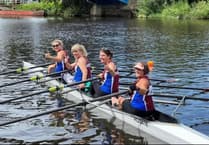MATHILDA Hodgkins-Byrne, the 30-year-old rowing star from St Weonards, continues to inspire athletes around the world as she reflects on her historic achievement at the 2024 Paris Olympics.
There, she became the first mother to win an Olympic medal for Team GB in rowing, securing a bronze in the women’s double sculls alongside her crewmate Rebecca Wilde.
Hodgkins-Byrne’s journey to the podium wasn’t a straightforward path. Her Olympic story began at the Tokyo Games in 2021, where she and her sister Charlotte competed in the women’s quadruple sculls, finishing in seventh place.
At that point, Hodgkins-Byrne was faced with a life-changing decision: retire from elite sport or return after giving birth to her son, Freddie.
Rather than stepping away, Hodgkins-Byrne chose to defy the norm and continue her rowing career. Despite the pressures surrounding pregnancy and its potential impact on an athlete’s performance, she was determined to make a comeback.
“I realised very quickly that I either had the decision of retiring – and my last result being seventh place at Tokyo with people probably saying I stopped because I became pregnant – or I carry on and see if it is possible to come back in three years,” she told Sportsbeat: “There was only ever going to be one outcome.”
Between November 2023 and March 2024, she endured grueling training camps in Portugal while also navigating the responsibilities of motherhood. Hodgkins-Byrne credits her success to the strong support network of family and loved ones who helped care for Freddie while she trained.
Her mother played a vital role, taking time off work to stay nearby with Freddie so she could see him in between sessions. Additionally, her partner took leave before the Olympics to look after their son.
“Without my family, there’s absolutely no way I could have done it. It takes a village,” she explained: “They gave me the perspective and strength I needed to keep going. Being able to see Freddie between sessions was incredibly important for me, particularly during the final stages of selection for the double. It kept me focused and reminded me of why I was doing it.”
For Hodgkins-Byrne, the most meaningful moment of her Olympic experience wasn’t the medal itself, but what it symbolised: a triumph not only for her career but for mothers in sport.
"The thing that means the most to me was Freddie being passed to me when I got onto the podium," she said: "That will always be the most special thing to me, more than I ever could have hoped for. Freddie was why I did it, and my reason for coming back."
Looking back on her return to elite sport after motherhood, Hodgkins-Byrne is proud to be part of a growing movement of female athletes challenging outdated attitudes about pregnancy and career longevity.
She is also motivated by the idea of serving as a role model for future generations of female athletes.
For Hodgkins-Byrne, winning an Olympic medal post-pregnancy isn’t just a personal victory—it’s a victory for women in sport, showing that elite athleticism and motherhood are not mutually exclusive.




